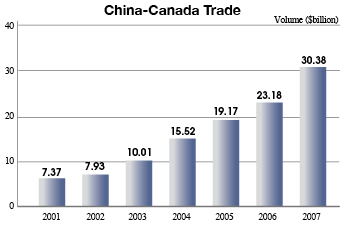| The ongoing global financial crisis might give a boost to the relationships between Chinese and Canadian businesses, said Peter Harder, President of the Canada China Business Council (CCBC). In an interview with Beijing Review reporter Yan Wei, Harder underlined the need to explore the potential for strengthening China-Canada trade ties while rejoicing at the development of the two countries' bilateral relations.
Beijing Review: What's your comment on the trade relations between China and Canada in 2008?
|

|
|
"The opportunity for Canadian investment in China and for Chinese investment in Canada is greater than the current numbers would indicate."--Peter Harder, President of the Canada China Business Council (COURTESY OF CCBC) |
Peter Harder: Canada is proud to be an early and long-term partner of China. This relationship began with Canadian wheat shipments to China 60 years ago and has continued to strengthen. CCBC was founded in the same year that China opened its economy to the world-1978. It is the oldest bilateral trade organization active in China, and we treasure the friendships and partnerships we have built in the intervening 30 years.
CCBC celebrated its 30th anniversary in 2008 with a historic trade mission of five Canadian provinces and more than 600 Canadian and Chinese CEOs and business leaders meeting together in Beijing, Chongqing and Shanghai.
In terms of bilateral trade, it grew between Canada and China last year. Canadian exports to China reached $10.3 billion in 2008; that was up about 8.5 percent from $9.5 billion in 2007. Imports from China were up about 11 percent-from $38.3 billion in 2007 to $42.3 billion in 2008.
Trade growth between our countries is a cause for celebration in a year marked by the swift onset of a global downturn.
Are you satisfied with the performance of Canadian businesses in China?
We should never be satisfied, knowing that we can always improve the economic relationships between our two countries. The opportunity for Canadian investment in China and for Chinese investment in Canada is greater than the current numbers would indicate. We believe that we need to make much greater headway in increasing bilateral trade and investment with China. Having said that, we are pleased with the growth in our bilateral relations.
How has the global financial crisis affected trade between the two countries?
In 2008 we did increase trade between our countries, albeit not as much as we would like to see.
How can the two countries' business communities jointly cope with the impact of the crisis?
There is an opportunity for Canadian and Chinese businesses to strengthen their relationships. Constraints in other trade relationships need to be offset with greater efforts to grow Canada-China trade.
Against the backdrop of the financial crisis, how would you evaluate the potential of Canada-China trade relations? How do we tap that potential?
We need to redouble efforts to have business leaders in China and Canada explore-priority sector by priority sector-more areas for cooperation. For example, China has announced a very significant infrastructure stimulus package. There are many Canadian companies already active in China that would be ideal partners in this spending. To offer one example, Canadian wood products companies are helping China rebuild after the disastrous earthquake in 2008. The Government of Canada and the province of British Columbia have signed an $8 million deal to use Canadian wood products to help build schools and senior citizens facilities in Sichuan Province.
What are the major problems? How should we address them?
In terms of economic uncertainty, we must share our experiences more vigilantly.
Do you think the Canadian Government's conservative foreign policy has hindered trade and investment between China and Canada?
The Canadian prime minister has indicated that he is interested in visiting China. CCBC welcomes this initiative. We are firmly of the belief that political relations are directly linked to economic relations between countries.
Canada's Share of China's Stimulus Pie
China unveiled a 4-trillion-yuan ($571.4 billion) economic stimulus package last November. In a report issued in January, CCBC points out that Canada will benefit in many ways from this package. Excerpts of the report follow:
As noted, the lion's share of spending under the stimulus package will be directed toward projects related to transportation, earthquake reconstruction, environmental and ecological protection, rural infrastructure development and industrial innovation. Canada has substantive technology strength in many of these priority areas for stimulus spending, particularly in:
- rail transportation
- aviation
- airport facilities
- construction management
- environmental protection
- energy efficiency
- clean production
Canada's track record in these areas of competence is demonstrable. Canadians have been involved in many of China's largest undertakings, including the Three Gorges Project, the Qinshan Nuclear Power Project, the Geheyan-Shanghai high-voltage transmission project and high-speed trains. There has been strong Canadian participation in somewhat lower-profile infrastructure undertakings such as highway design, aviation simulation, and medical and educational professional training by Canadian experts.
Canadian companies have the technology and know-how to qualify for a piece of the action in China's stimulus spending. The opportunities will go to those companies having a good China strategy and long-term commitment.
Intellectual and expertise transfers, for example, may be ways to take part in the stimulus package. Industrial innovation and Canadian research and development strength, in combination with Chinese manufacturing strength, would be a potent mix.
What's more, this might be an ideal avenue for Canadian small and medium-sized enterprises (SMEs) to participate in the China market. For SMEs, though, it will be important to have niche technologies or products and/or strong partnerships with local companies.
About CCBC
CCBC is a private, membership-based association that seeks to facilitate and promote trade and investment between Canada and China. CCBC has more than 300 member companies. Its members range from some of the largest and best-known Canadian and Chinese firms to leading innovators and entrepreneurs of small and medium-sized enterprises in both Canada and China. Members represent a diversity of sectors, including financial services, legal services, information and communications technology, education, manufacturing, construction, transportation, mining and energy. Headquartered in Toronto, Canada, CCBC has offices in Vancouver, Beijing and Shanghai.


| 